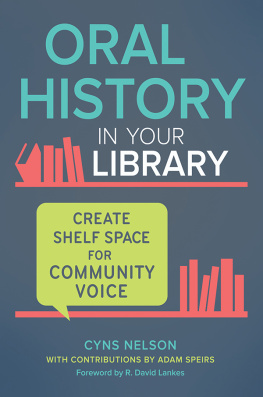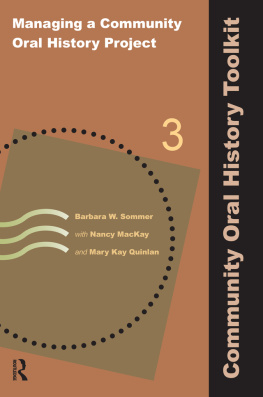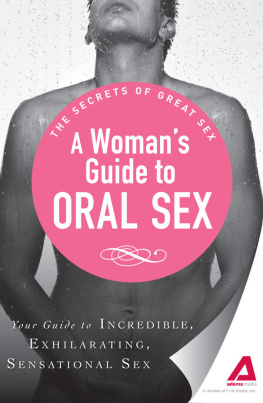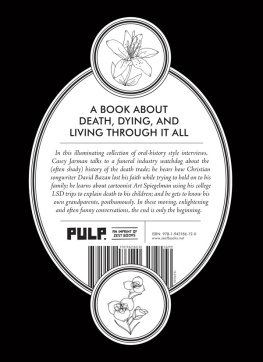Listening on the Edge
Listening on the Edge
Oral History in the Aftermath of Crisis
Edited by Mark Cave and Stephen M. Sloan


Oxford University Press is a department of the University of Oxford.
It furthers the Universitys objective of excellence in research, scholarship,
and education by publishing worldwide.
Oxford New York
Auckland Cape Town Dar es Salaam Hong Kong Karachi
Kuala Lumpur Madrid Melbourne Mexico City Nairobi
New Delhi Shanghai Taipei Toronto
With offices in
Argentina Austria Brazil Chile Czech Republic France Greece
Guatemala Hungary Italy Japan Poland Portugal Singapore
South Korea Switzerland Thailand Turkey Ukraine Vietnam
Oxford is a registered trademark of Oxford University Press
in the UK and certain other countries.
Published in the United States of America by
Oxford University Press
198 Madison Avenue, New York, NY 10016
Oxford University Press 2014
All rights reserved. No part of this publication may be reproduced, stored in a retrieval system, or transmitted, in any form or by any means, without the prior permission in writing of Oxford University Press, or as expressly permitted by law, by license, or under terms agreed with the appropriate reproduction rights organization. Inquiries concerning reproduction outside the scope of the above should be sent to the Rights Department, Oxford University Press, at the address above.
You must not circulate this work in any other form and you must impose this same condition on any acquirer.
Cataloging-in-Publication data is on file with the Library of Congress
ISBN: 9780199859306 (pbk)
ISBN: 9780199859313 (hbk)
9 8 7 6 5 4 3 2 1
Printed in the United States of America
on acid-free paper
To all of our narrators who have shared their experiences in the wake of catastrophe
Contents
This project began with a conversation I had with Don Ritchie on a riverboat cruise excursion at the 2008 Oral History Association meeting in Pittsburgh. We talked about the work that I was doing with the Historic New Orleans Collection to document the aftermath of Hurricane Katrina. He introduced me to fellow Oxford Oral History Series editor Rob Perks and to Oxford executive editor Nancy Toff. My initial intent was to focus the book entirely on the Hurricane Katrina project that I had been working on, devoting each chapter to a different lesson learned. Nancy and the series editors (who also included Todd Moye and Kathryn Nasstrom) wisely recommended a broader approach as it would give the reader insight into the varied nature of crises. Nancy and Todd put me in contact with Stephen Sloan, who at the time was the chairman of OHAs Emerging Crises Research Fund. I had known Stephen for a number of years and was thrilled with the opportunity to partner with him on this project. The experience of working with both Stephen and Nancy has been an enjoyable one from start to finish.
I want to thank in particular Mary Lou Christovich for her longtime support of my interest in oral history; Priscilla Lawrence, Alfred Lemmon, and John Lawrence for their unfailing kindness and patience; and Jessica Dorman, Aimee Everett, Sonia Tycko, and Max Richman for their invaluable expertise. I would also like to thank my family; my wonderful sister, Terri Potter; my parents, Gilbert and Kathleen Cave; and my constant companions Junior, Monkey, and Orange Cat.
Mark Cave
My interest in this project was spurred by my research documenting the experience of Mississippians after Hurricane Katrina while I was co-director of the Center for Oral History and Cultural Heritage at the University of Southern Mississippi. Mark Cave has been the ideal collaborator on the work, and Nancy Toffs encouragement and direction on this volume have been invaluable. Id like to thank Linda VanZandt, my tireless colleague at USM, and all the members of our stellar team here at Baylor Universitys Institute for Oral HistoryLois Myers, Elinor Maz, Becky Shulda, and Michelle Holland. Their passion and commitment to excellence in oral history are inspiring. Most importantly, Id like to thank my always supportive and encouraging family, Melissa, Jacob, and Riley. Sharing life with you is bliss.
Stephen M. Sloan
Crisis is a historical constant. In 2011 alone, we watched the television news in horror as the ocean swallowed coastal communities in Japan. We were touched by the sight of families digging through rubble after tornadoes in Missouri and Alabama and after earthquakes in Turkey and New Zealand. We were sickened by the senselessness of a school shooting in Brazil; angered by terrorist attacks in Russia and Norway; and inspired by revolution in Egypt, Tunisia, and Libya. Our attention to these events is held, but not for long. Our thoughts are consumed by daily routine or captured by the next headline. What remains when the cameras turn away, and reporters go home, are individuals and communities in the process of redefinition, forever changed by the event. Exploring the process of this change in a single life or the life of a community can tell us a great deal about who we are and who we are likely to become. Oral history as a methodology, with its patient, open-ended approach and emphasis on empathy, is well suited as a tool for this exploration.
Recording the experience of crisis is central to what the oral historian does, but most commonly such recollections have been captured long after events. In recent years, there has been a trend to conduct interviews soon after, or even in the midst of, crisis. This work presents unique possibilities, but also some significant concerns. Perhaps in reaction to the recent popularity of interviewing in the aftermath of crisis, many oral historians have expressed concerns regarding the psychological impact of the interview process on interviewees. Clinical psychologist and psychoanalyst Ghislaine Boulanger has been an important figure in recent years in bridging the gap between the psychology and oral history communities. She has taught at the Columbia Center for Oral History (CCOH) Summer Institute and worked with CCOHs Rule of Law Oral History Project. Boulanger suggests that if an interviewee is willing to talk about his or her experience, then it is generally safe to proceed with an interview. In fact, the process can serve to validate the individuals traumatic experience and help the survivor Oral historians are in a unique position to provide this validation since they are often seen by interviewees as agents of a communitys collective memory.
Boulanger first became involved with the oral history community as a narrator, interviewed by oral historian Mary Marshall Clark concerning Boulangers psychotherapy work following the September 11 terrorist attacks in New York City.
Dutch oral historian Selma Leydesdorff conducted life story interviews with women who survived the Bosnian genocide, and she has written and lectured extensively on the issue of trauma. Much of her work relates to the impact of traumatic experiences on memory. She notes how a traumatic experience can distort the recall of events, causing a chronological incoherence within narratives. For some, the traumatic event dominates their life story and colors the memories of their life both before and after the event. This obviously presents challenges for the oral historian. Interviewers need to be patient and empathic listeners and embrace the process of helping the interviewee create order in a chaotic memory.
Next page






